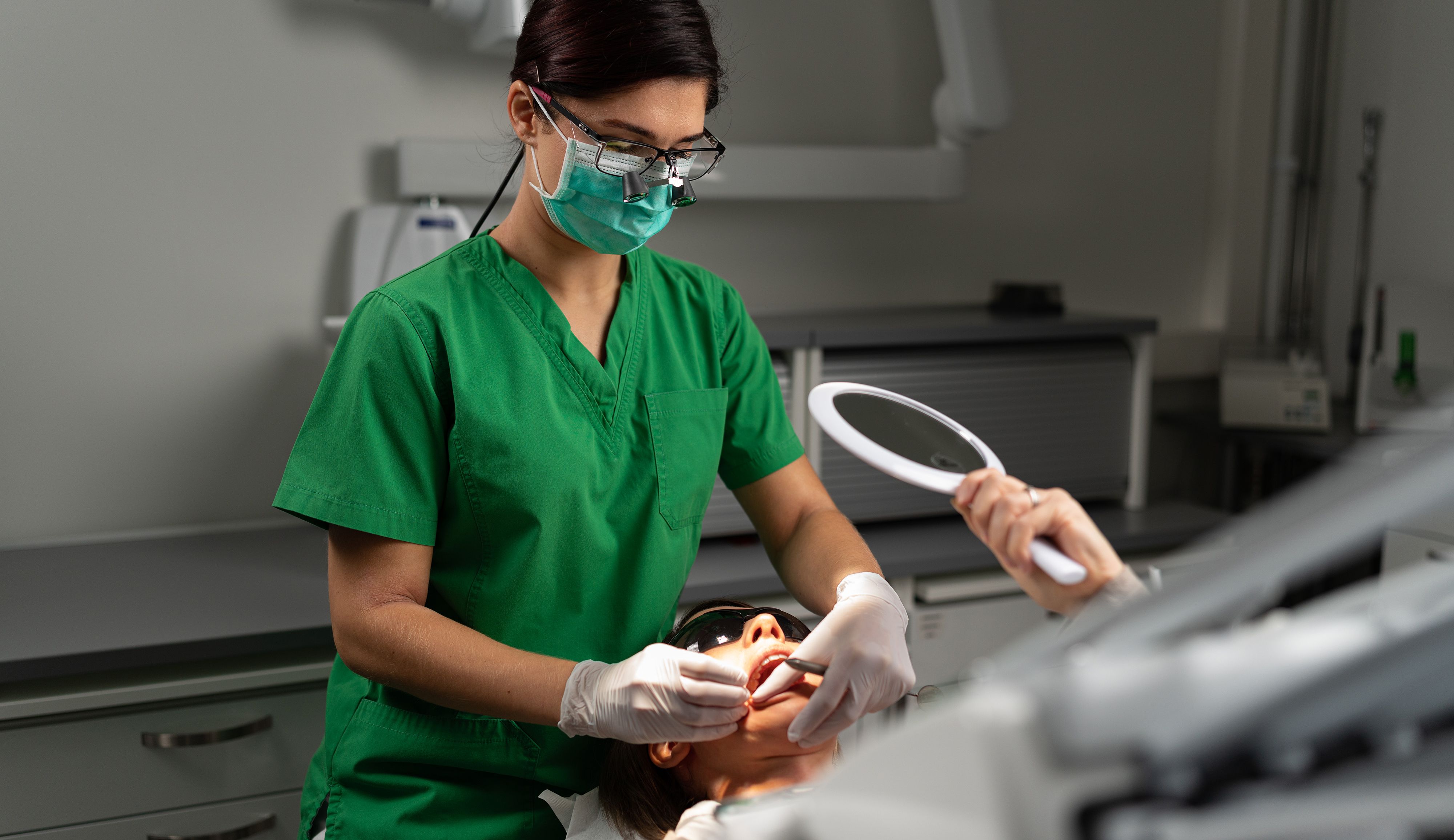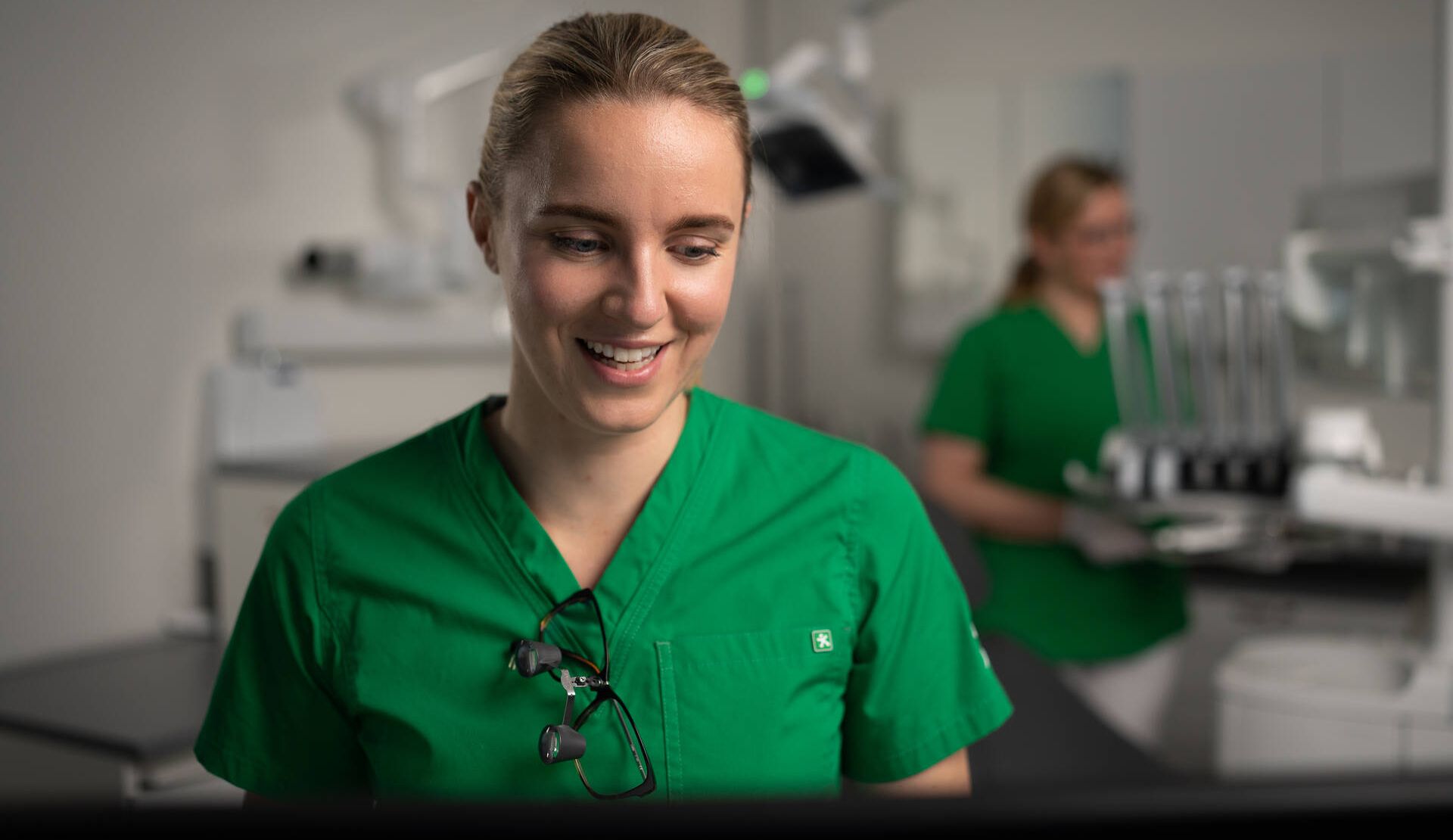
Dentures or false teeth
Pay flexibly with various payment methods. Learn more about the different payment and financing services we offer and choose the one that suits you best.
Outpatient clinic fee of a visit to the dentist is 37,90 € and for a dental hygienist visit is 27,90 €.
As of March 15, 2023, the polyclinic fee does not have to be paid after more than five reception visits during the calendar year. After the fifth payment, the polyclinic fee is 0 € for visits for the rest of the calendar year.
The Kanta fee (4 €) will be charged for visits to Hammas Mehiläinen starting from January 1, 2026.
If you visit our clinic and do not pay for your appointment using the available payment methods, we will send you an invoice for your appointment. The invoicing fee is 5,20 €.
If the procedure is booked with a specialist dentist, the prices are increased by 30 %.
Check out Hammas Mehiläinen's flexible payment methods.
| Service | Price estimate |
|---|---|
| Dental check-up | 56,00 € Without Kela reimbursement 86,00 € |
| Dental check-up for patients with dental fear | 93,00 € Without Kela reimbursement 123,00 € |
| Children and young people dental check-up The dental check-up performed by a dental specialist. Book a dental check-up for children and young people Prices 81,00–121,00 €, without Kela reimbursement 111,00–160,00 € | 81,00 € Without Kela reimbursement 111,00 € |
| Dental X-ray of the teeth and jaws | Mobile Benefit 90,00 € The price with a doctor's referral after Kela compensation is 79 €. 110,00 € Without Kela reimbursement 120,00 € |
| Tartar removal 30–45 minute appointment with a dental hygienist. Book an appointment for tartar removal Explore different payment methods Prices 122,00–169,00 €, without Kela reimbursement 142,00–199,00 € | from 122,00 € Without Kela reimbursement from 142,00 € |
| Tooth jewellery application The price does not include the price of tooth jewellery. | from 69,00 € No Kela reimbursement |
| Dental fillings 1–3 surfaces. Prices 97,00–216,00 €, without Kela reimbursement 107,00–236,00 € | from 97,00 € Without Kela reimbursement from 107,00 € |
| Ceramic filling of the tooth 1–3 surfaces. Explore different payment methods Prices 287,00–589,00 €, without Kela reimbursement 287,00–629,00 € | from 287,00 € Without Kela reimbursement from 287,00 € |
| Dental ceramic crown Laboratory costs are not included in the price estimate. Explore different payment methods Prices 627,00–812,00 € | from 627,00 € No Kela reimbursement |
| Chipped tooth Prices 97,00–216,00 €, without Kela reimbursement 107,00–236,00 € | from 97,00 € Without Kela reimbursement from 107,00 € |
| Tooth extraction Explore different payment methods Prices 113,00–768,00 €, without Kela reimbursement 123,00–808,00 € | from 113,00 € Without Kela reimbursement from 123,00 € |
| Tooth whitening Price estimate given at the free consultation appointment. Book an appointment for a free whitening consultation. Prices incl. VAT Prices 102,00–461,00 € | from 102,00 € No Kela reimbursement |
| Whitening consultation appointment Includes an individual price estimate for teeth whitening. Book an appointment for a whitening consultation. | Free No Kela reimbursement |
| Anaesthesia | from 42,00 € Without Kela reimbursement from 42,00 € |
| Irrevocable absence Prices 75,00–98,00 € | 75,00 € No Kela reimbursement |
| Initial assessment of sleep apnea Learn more about sleep apnea and book an appointment (in Finnish) | from 155,00 € Without Kela reimbursement from 185,00 € |
| Bite guard Includes clinical work and the bite guard. Prices 648,00–692,00 €, without Kela reimbursement 708,00–752,00 € | 648,00 € Without Kela reimbursement 708,00 € |
Dental prostheses, or artificial denture, in a nutshell
- Missing teeth are replaced with dental prostheses or false teeth.
- Crowns and veneers are permanently fixed to your own tooth. The crown can also be fixed to an artificial root screwed into the jawbone.
- Removable dental prostheses are made as full dental prostheses or partial prostheses, depending on the amount of tooth loss.
- Dental prostheses are always custom-made. Your dentist will work with you to design the solution that best meets your needs.
Why dental prostheses or artificial denture?
Dental prostheses may be a good idea if you are missing teeth and cannot enjoy eating normally. In addition, all dental prostheses can be used to improve the appearance of teeth that have become badly damaged.
Missing teeth can cause bone loss in the affected area. A missing tooth can also cause teeth adjacent to the empty space and the opposing tooth to move out of position in the mouth. This can later make it difficult to replace the missing tooth with a dental prosthesis – so it's worth getting the problem fixed early.
Dental prostheses – What are the options?
There are many different types of dental prostheses – generally they are divided into fixed and removable dentures. We will always find the right solution for your situation!
What are the options?
- A crown is a fixed structure that fits over a tooth or implant screw and looks exactly like your own tooth.
- A laminate is a lighter option than a crown and is suitable for treating the visible frontal area. A laminate covers the visible surface of your tooth when you smile.
- A dental bridge replaces one or more missing teeth and is supported by your own teeth or implant screws.
- Partial prostheses is removable, and can be entirely acrylic or include a metal frame. The prosthesis rests on the oral mucosa or teeth and is held in place by metal hooks on the teeth. Partial dental prostheses are used when a large number of teeth are missing and a fixed prosthesis is not possible.
- Complete prostheses are acrylic. At the top, it is held in place by a tight air seal against the ridges of the upper jaw, while the lower jaw prosthesis is held in place by the lower jaw ridges and gravity.
Production takes many steps
Dental prostheses are made step by step to ensure you get a prostheses that fits perfectly and looks like the real thing. This is how it's done:
The first step is to start with the first stage of the prosthetic treatment. Before starting prosthetic treatment, your dentist will treat caries, gingivitis, periodontitis and other possible oral diseases. The dental hygienist removes tartar.
When considering dental prostheses, start by booking an appointment with your dentist. We will examine your situation and clarify your wishes to find the most suitable prosthetic treatment for you. We often take x-rays and design models to support the design, either digitally or by traditional reproduction.
Prosthetic treatment can take up to one and a half years to complete and require multiple visits. Sometimes it may be necessary to modify the jaw bone or soft tissue prior to inserting permanent implant screws. For the most demanding implant prosthetic work, we use digital 3D design to ensure the best possible treatment outcome and minimise risk.
Preparation of the prostheses. In cooperation with your treating dentist, a dental technician in our dental laboratory will fabricate a dental prosthesis that fits your mouth perfectly and looks natural.
Installation of prostheses. The dentist will fit the prosthesis in your mouth during your appointment. The fitting is painless. Properly prepared prosthesis will fit in your mouth. Your dentist will also provide you with clear instructions for home care. Finally, your dentist will tell you the appropriate interval for your check-up.
Follow-up appointment. We will also take care of the situation in your mouth after the implantation of the prosthesis. Sometimes it is a good idea to check the fit of the dental prosthesis at a follow-up visit – with loose prostheses, problems can occur even if it feels right in your mouth at the fitting. We will finish fitting the prosthesis as needed.
Repairing the prostheses. With good home care, a fixed prosthesis can last up to ten years or more. The mucous membranes become deformed when loose prostheses are worn, and initially, loose prostheses may need to be reshaped by resurfacing up to a year after fitting.
Cleaning removable prostheses
Acrylic, often used as a material for removable dental prostheses, repels dirt well but can crack when it dries. This can make it easier for oral contaminants to adhere.
Tartar can stick to the surface of the dental prosthesis, just like real teeth – so remember to clean your dental prosthesis carefully!
- Clean your dental prosthesis twice a day.
- Remove the dental prosthesis from your mouth for cleaning.
- Wash dental prostheses with a soft brush designed for denture cleaning.
- Use a non-abrasive denture cleaner that will not damage the acrylic surface.
- Rinse with lukewarm water.
Dental prosthesis repair renews your teeth
Your dental prosthesis will last a long time if you take good care of them at home and have regular dental check-ups.
Sometimes your dental prosthesis can break. When this happens, it's a good idea to see a dentist. All dental prostheses can be repaired if necessary.
If your dental prosthesis feels loose or out of place, book an appointment at Hammas Mehiläinen. We will check the functionality of your dental prosthesis and fix it, good as new.
Symptoms related to oral health
Aphthae
Painful and itchy ulcer on the oral mucosa.
Bad breath
Often behind the smell is a problem that needs the help of a dentist.
Bruxism or teeth grinding
Tooth damage, sore bite muscles or headaches.
Chipped tooth
A piece of a tooth or a filling has come loose. Make an appointment with your dentist.
Dental cavity
Can feel like an enmity or a toothache - or you don't feel anything special.
Dental staining
Can be caused by a number of factors, such as cavities, enamel development disorders or foods.
Gingivitis
Bleeding from the gums, bad breath, bad taste in your mouth and sore gums.
Mucosal and oral diseases
The cause of severe or persistent mouth symptoms should be investigated by a dentist.
Periodontitis
A common disease of the connective tissue underneath the gums which is caused by gingivitis.
Sensitivity
Pricking and sudden pain, often caused by cold, hot or touching the tooth.
Tartar
Is a bacterial plaque hardened by salivary minerals.
Temporomandibular disorder (TMD)
Pain and dysfunction of the jaw joints and masticatory muscles.
Tooth enamel damage
Tooth enamel damage is caused by tooth wear or problems with biting.
Toothache
Can be caused by a cavity or an inflamed tooth, as well as a partially erupted wisdom tooth.
Other related services
A dental implant replaces
Specialist dentist consultation and planning of further treatment.
Ceramic CEREC filling
More durable than conventional filling materials and a more aesthetic result.
Ceramic fillings
Modern and aesthetic ways to repair damaged teeth.
Clear aligner treatment with Invisalign aligners
Dentist consultation visit and selection of the Invisalign treatment method.
Cosmetic dental care
Can be used to alter the appearance of teeth and fix functional issues.
Dental X-ray
An important part of oral health care and an effective way to reveal oral diseases that the eye cannot detect.
Dental check-up
Assessment of oral and dental health and recommendations for further treatment.
Dental check-up for children and young people
Specialist dental check-up visit for children and adolescents.
Dental cone beam imaging
Provides highly accurate three-dimensional information on dental and jaw structures.
Dental fear
Non-urgent consultation with a dentist specialized in treating patients with dental anxiety.
Dental fillings
Filling a tooth involves removing decayed tooth tissue and replacing it with a filling material.
Dental hygienist
Provides individual advice for tending to your oral health.
Dental laminates or veneers
Can be used to correct colour defects, straighten individual teeth on the dental arch without orthodontic treatment.
Dental specialists
Are dentists who are specialised in one of the disciplines of dentistry. Specialist dentist consultation.
Dental staining removal
Dental staining removal by a dental hygienist, including soda cleaning.
Dental treatment under general anaesthesia
The most common reason for performing dental treatment under general anaesthesia is dental fear.
Dentist
Performs oral health examinations and treats oral diseases and other problems.
Emergency dental care
Emergency visit for sudden toothache, accident or other acute symptoms.
Laser teeth whitening
A gel is applied to the surface of the teeth and the effect is enhanced by light.
Massage of masticatory muscles
The massage of masticatory muscles alleviates pain in the head and jaw area.
Occlusal splints or mouth guards
Help the teeth muscles relax and protect teeth and dental structures.
Oral surgery
The examination and surgical treatment of the masticatory system and related tissues, diseases, and injuries.
Orthodontic treatment
Specialist dentist consultation to assess the need for orthodontic treatment.
Root canal treatment
The dentist treats an infected pulp of a tooth.
Sleep apnoea oral appliance
A treatment especially for mild sleep apnoea.
Tartar removal
Removal of tartar performed by a dental hygienist, including soda cleaning.
Teeth whitening
The safest and best teeth whitening is performed by a dental hygienist or dentist.
Tooth extraction
Sometimes, a tooth is in such bad condition that it cannot be saved.
Tooth jewellery application
A dental hygienist applies tooth jewellery safely and durably.
White Spot treatment
Fading or removal of tooth discolorations.
Whitening consultation (free)
The purpose of the consultation is to identify a possible need for treatment.
Wisdom tooth extraction
Wisdom teeth usually cause problems because there is not enough space for them to erupt.



